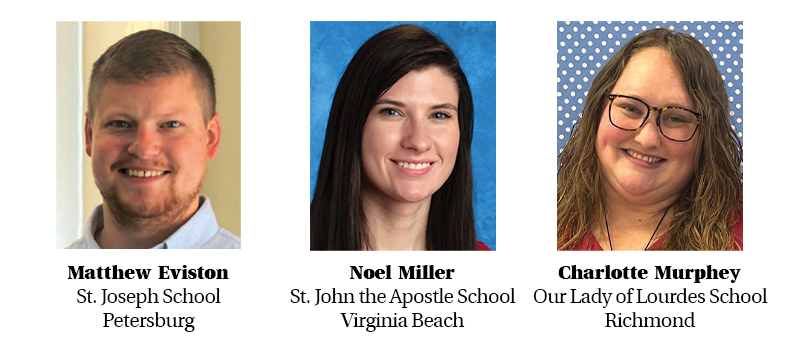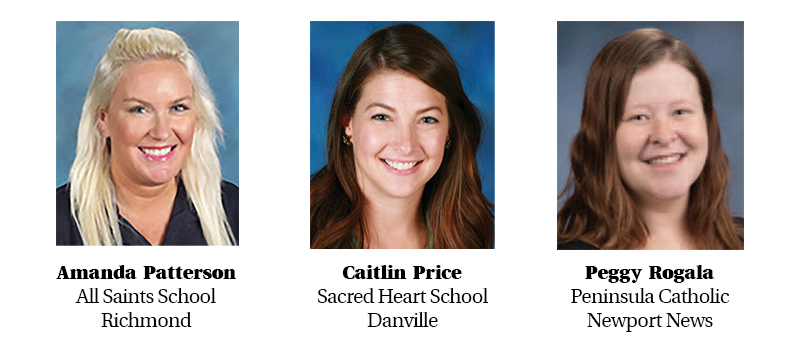Faith element, family atmosphere attract educators
Some educators in Diocese of Richmond Catholic schools are in their first teaching assignments. Some have experience in the public school system, and others received a Catholic education themselves.
A common thread among teachers from these various experiences, however, is the appreciation they have for the “family feel” and sense of community they find in working at a Catholic school.
“That really is the one thing someone coming out of college should know – Catholic school is really much more like a family when you come to it,” said Matthew Eviston, religion and social studies teacher at St. Joseph School, Petersburg. “Whether as a student or a teacher, I’ve always had the Catholic identity, Christ-centered, family environment that you can’t get anywhere else.”
Amanda Patterson taught in Chesterfield County Public Schools for five years before joining All Saints Catholic School, Richmond, as a kindergarten teacher in 2017.
“It’s more than a school, it’s more than a job; it’s really part of your life, whereas I didn’t really feel that in the public school system. The difference is amazing,” she said.
Support from students’ families
That sense of truly belonging to a community does not end at the school building doors; it extends to the families of Catholic school students, as well.
Noel Miller, in her first year as a second- grade teacher at St. John the Apostle School, Virginia Beach, said her experience has been “very welcoming and very inviting,” and that she feels supported by her students’ families.
“I get a lot of support from my parents. They’re willing to work with their child if the child is struggling, and even if they’re doing well, they’re very supportive” she said.
Charlotte Murphey, a fourth-grade teacher at Our Lady of Lourdes, Richmond, since December 2020, said the engagement she receives from the students’ families is “mind-blowing” and that it helps her feel at home with her work.

“You’ve really got a sense of community with your coworkers, teachers, parents and your community,” she said. “It’s hard to put into words, but there’s just something so special about teaching in a Catholic school.”
Openly talk about God
Part of what makes Catholic schools such a special place to live out the vocation of teacher is the ability to have God present in work relationships. It helps teachers form a true sense of community in which everyone takes care of each other.
“I really enjoy coming to school. Or if something is wrong or something happens to me, I know that the other teachers and employees at this school truly care about my wellbeing,” noted Caitlin Price, kindergarten teacher at Sacred Heart School, Danville.
Eviston said his colleagues at St. Joseph lift him up to be a better teacher and noted that following Christ’s word “is what brings us together.”
At Catholic school, teachers have the freedom to be true to their personal beliefs. Trying to compartmentalize the faith while working in a public school could prove to be a challenge for some educators.
Murphey, who attended Lourdes as a student, said that being able to put her faith into her teaching was important to her.
“I told them in the interview, ‘I can’t separate my faith from my teaching because I think they are the same thing,’” she explained, adding that returning to Lourdes as a teacher was “always a dream.”
Openly talking about God and church at school was a great part of the appeal Patterson found in making the switch to a Catholic school. Peggy Rogala, religion teacher at Peninsula Catholic High School, Newport News, said that the ability to live out her faith in school and to bring faith into every subject area is a great freedom that makes Catholic schools unique.
“I know teachers care about kids, period. But in a Catholic school, we get to care about them and help them in a way that feels like they can take the tools we’re providing to be a spiritual person and take that into life after they leave us,” she explained. “And they might not get that anywhere else, so the religion aspect sets it apart.”
Teaching tailored to students’ needs
A major benefit of working in Catholic education is the freedom to develop teaching styles that meet the needs of individual students rather than feeling pressured to meet state standards.
“It’s just my opinion that teaching in a Catholic school does allow a teacher to really choose how they want to teach their class without any strict state standards you have to follow like in a public school,” Eviston said. “We’re teaching not so much for an SOL (Standards of Learning) test, but we’re teaching based off what is Christ-centered and what the Gospel is telling us.”

Price noted that in college, education majors are taught that each student learns differently. She feels that the private school system is “much more adaptive” and gives teachers more freedom to cater to individual students’ needs, which helps one “find out who you are as a teacher.”
Patterson agreed.
“I think it depends on the public school you’re in. I was in a Title I school, and you were very monitored – you have to be doing this at this time and something else at another time,” she said. “That can be very stressful, and it took away from being able to teach and just enjoy it. In the Catholic school, I feel like I can enjoy my job.”
She added that the presence of a teacher’s aide in her classroom at All Saints, something she did not have in the public school, makes a big difference as well.
Creative community
Rogala likes the “big happy family” at Peninsula Catholic, which is made possible by smaller class sizes than are typically found in public schools. This benefit allows teachers to get to know students on a “great level” and stay in touch with them after they move on.
Not only is getting to know students on a deeper level a valuable asset of teaching at a Catholic school, but educators also get to teach more than just the set curriculum.
For example, Miller said that “teaching students how to interact with people in a positive way, teaching them manners, showing them how to respect other views,” is one of her greatest joys of teaching at St. John, along with fostering the Catholic identity through the inclusion of religion in the curriculum.
While teachers in Catholic schools are required to follow the consensus curriculum, they are able to achieve teaching goals through creative lessons and opportunities.
“The creativity and the freedom of that community in a Catholic school is just something that could not compare, would not compare, to a public school,” Murphey said.
Revived passion for teaching
For any educator who may be feeling unsure in the profession, or who may be considering making the switch from public to Catholic school, Rogala suggests considering the reasons one went into education in the first place.
“Remember why you became a teacher,” she said. “Is it to grade papers all night? No. Is it to know the kids? Then this is the place. It gets reignited by the interactions with students, that reason for teaching.”
Price, a teacher for nine years, started her career at a private Episcopal school and then made the transition to public schools. After two years in a public school, she found herself questioning whether education was the best profession for her.
“I kind of had lost my passion for teaching, and I knew, or was hoping, that in coming to a private school again, I would have more control over what I taught and how I taught it,” she said.
“Sacred Heart really revived my passion for teaching and really made me see that this is what I love, and I do love teaching students and being creative and helping them to learn and grow every year. That is entirely due to Sacred Heart Catholic School,” she said.
Editor’s note: For more information about teaching opportunities in the Catholic Diocese of Richmond schools, visit richmonddiocese.org/office/catholic-schools. You can view a video about teaching in the Diocese of Richmond in our video archives.

